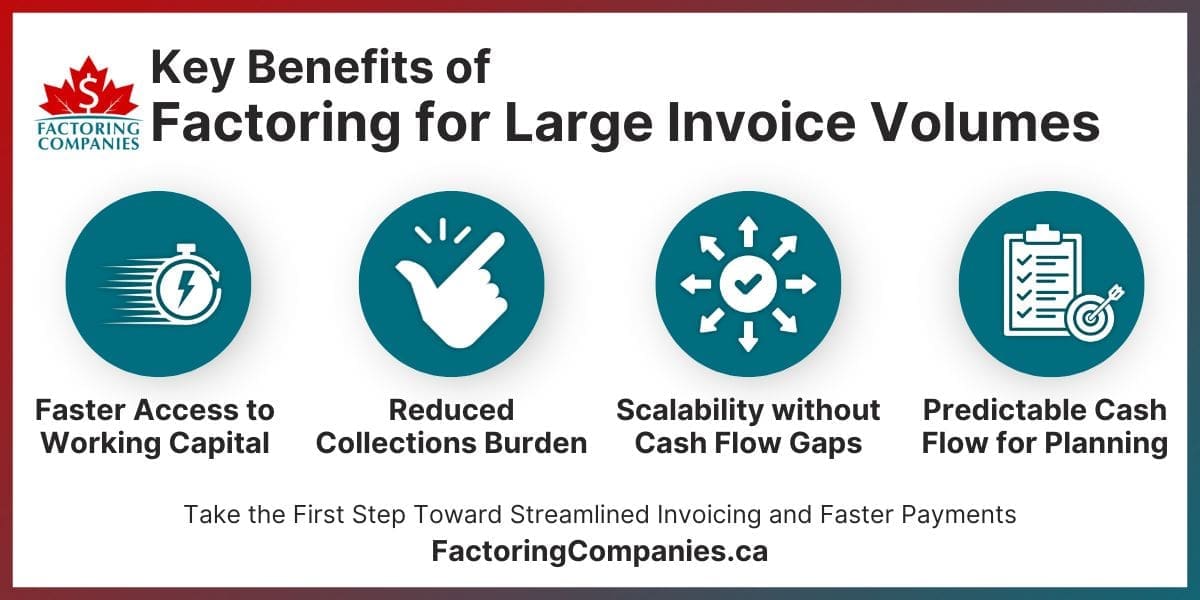
Do you feel like your business is buried under a mountain of receivables that you don’t have the time or energy to chase? This situation is common in certain industries, and it can result in a number of problems, ranging from late payments to cash flow issues. High-volume invoice factoring might be the solution you’re looking for. Give us a few moments, and we’ll walk you through how it can boost your cash flow and reduce your back-office burdens.
How to Know if You’re in the High-Volume Invoicing Category
When people say “high-volume invoicing,” it means your business is processing a large number of individual invoices in a short period. While there’s no universal cutoff for this, it often means you’re generating hundreds or even thousands of invoices in a month. Don’t fret if you’re producing far fewer invoices than this, though, as the solutions we’ll cover can still help.
Common High-Invoicing Industries
Certain B2B sectors tend to experience high-volume invoicing. We’ll take a look at a few industries below.
- Transportation and Freight Brokerage: When it comes to trucking companies and freight brokerages, multiple loads are commonly invoiced daily, and they’re often sent to many different shippers or brokers.
- Staffing Agencies: Dozens or hundreds of workers generate separate invoices for their placements at staffing agencies each week.
- Manufacturing and Wholesale Distribution: Large product runs shipped to many buyers can quickly create hundreds of invoices for manufacturers and wholesale distributors.
- Janitorial and Maintenance Services: It’s common for janitorial service companies and maintenance companies to have recurring service contracts for multiple locations, resulting in frequent billing cycles.
- Technology and Telecom Services: Often, technology companies such as software-as-a-service (SaaS) or telecom providers invoice numerous business accounts every month.
How High-Volume Invoicing Impacts Your Business
High-volume invoicing can affect your operations in many ways.
- Increased Administrative Load: Processing, verifying, and sending large numbers of invoices requires significant staff time. In fact, mid-sized businesses spend an average of 14 hours a week chasing down payments, according to Intuit. This figure translates directly into lost productivity.
- Greater Exposure to Delays and Errors: With more invoices in circulation, there are more opportunities for missing information, mismatched purchase orders, or customer disputes that can slow payment.
- Cash Flow Strain: Even when most customers pay on time, the sheer volume means there is almost always a portion of receivables tied up in the payment cycle, which can limit working capital.
- Heavier Collections Effort: Following up on dozens or hundreds of overdue accounts is time-consuming, and without a strong process, smaller balances can slip through the cracks.
These concerns create enough challenges as it is, but nearly half of all business‑to‑business (B2B) invoices in Canada are paid late, according to Atradius. This shifts the balance from maintaining steady cash flow to investing heavily in chasing money you’ve already earned just to stay afloat.
Apply High-Volume Invoice Processing Tips
Small process improvements can lead to significant time and cost savings. Consider these strategies to keep your billing workflow accurate, efficient, and less stressful.
Automate Where Possible
Use accounting software or integrated invoicing tools to generate, send, and track invoices automatically. This reduces manual entry errors and speeds up delivery.
Standardise Invoice Formats
Consistent templates make it easier for customers to process payments and help your team spot discrepancies faster.
Set Clear Documentation Requirements
Ensure every invoice is backed by accurate purchase orders, signed delivery receipts, or timesheets before it leaves your system.
Batch Your Processes
Group similar tasks, such as invoice approvals or sending reminders, to minimise switching between activities and boost efficiency.
Monitor Key Metrics
Track average days to payment, error rates, and disputed invoices so you can identify bottlenecks early.
Consider Cash Flow Solutions for Large Invoices
If late payments are a recurring challenge or you’re struggling to keep up with collections, invoice factoring, sometimes called accounts receivable factoring, can convert approved invoices into immediate working capital while freeing your team from collections.
Leverage B2B Factoring for Large Invoice Amounts
If your business is producing a significant number of invoices each month, staying on top of payments can quickly become an uphill battle. As mentioned, one solution many businesses turn to is invoice factoring.
How Invoice Factoring for SMBs Works
Let’s start with the big question: “What is invoice factoring?” Simply put, it’s a funding arrangement that lets you convert your accounts receivable into immediate cash. Here’s the basic process:
- Sell Your Invoices to a Factoring Company: You provide the factoring company with your approved invoices.
- Receive an Advance: The factoring company pays you a large portion of the invoice value up front, often within 24 hours.
- Collections and Final Payment: The factoring company collects payment from your customer. Once the payment is received, you get the remaining balance, minus the agreed-upon factoring fee.
Key Benefits of Factoring for Large Invoice Volumes
High-volume invoicing creates unique pressures that factoring can help relieve.
- Faster Access to Working Capital: Instead of waiting weeks or months for payment, you can access most of your receivables almost immediately.
- Reduced Collections Burden: The factoring company handles follow-ups, freeing your staff to focus on billing accuracy and customer relationships.
- Scalability without Cash Flow Gaps: As your invoice count grows, the amount you can factor grows with it, giving you the financial agility to take on more orders or contracts.
- Predictable Cash Flow for Planning: Consistent access to funds makes it easier to manage payroll, replenish inventory, or invest in growth opportunities without dipping into reserves.

Tips for Finding the Best Factoring Companies for High-Volume Invoices
When you’re exploring high-volume invoice factoring, you need a partner that can keep pace without adding friction to your process. Use these tips to identify companies that will meet your operational needs and financial goals.
Match Their Capacity to Your Volume
Not all factoring companies specialise in handling high-volume clients. Ask about their systems, staffing, and experience with businesses in your industry. A provider accustomed to processing bulk invoices can minimise errors, speed approvals, and ensure timely advances.
Evaluate Technology and Integration Options
High-volume invoicing benefits from automation. Look for factoring companies that integrate with your accounting or ERP software, provide online portals for submissions, and offer real-time tracking of payments and advances.
Understand Factoring Company Fees for Bulk Invoices
You can also use an invoice factoring calculator to get a better feel for how your volume impacts rates in advance. Some providers offer volume-based pricing, meaning the more invoices you factor, the lower your percentage fee may be. When you talk to companies directly, ask whether fees are charged per invoice, as a flat monthly rate, or based on total dollar value. Ask for a complete breakdown, including any hidden costs like minimum volume requirements or administrative charges.
Review Contract Flexibility
High-volume businesses often experience seasonal shifts or sudden spikes in billing. Flexible contracts, such as month-to-month agreements or adjustable minimums, can help you adapt without penalty.
Check Service and Communication Standards
With so many invoices in play, you need fast responses to questions or issues. Ask about average turnaround times for funding, dedicated account managers, and support availability.
Work with a Pro
Sifting through factoring companies to find the best match isn’t always effective and can drain your time. Consider working with a company like Factoring Companies Canada that can match you with factoring companies that are a good fit for your needs.
How to Streamline Invoice Factoring

Factoring can move cash into your account quickly, but delays often come from missing information, inconsistent processes, or poor communication. By tightening your approach, you can speed up approvals and funding.
Submit Complete and Accurate Documentation
Factoring companies rely on your paperwork to verify invoices before advancing funds. Provide all required supporting documents, such as purchase orders, signed delivery receipts, or approved timesheets, at the same time you submit the invoice. Missing or incorrect details can stall funding.
Maintain Up-to-Date Customer Approvals
If your factoring company requires debtor credit checks or account approvals, keep these current. Regularly review your customer list to ensure new accounts are pre-approved and existing approvals have not expired.
Use The Factoring Company’s Preferred Submission Method
Many factoring companies offer online portals or system integrations to speed processing. Submitting invoices through their preferred channel ensures they are received in the correct format and reach the right department immediately.
Follow the Agreed Submission Schedule
High-volume invoicing can overwhelm your own team and your factoring partner if submissions are sporadic. Establish a regular schedule, be it daily or weekly, and stick to it so both sides can manage workload and cash flow predictably.
Communicate Quickly About Disputes or Changes
If a customer disputes an invoice or requests changes, notify your factoring company right away. Proactive communication allows them to work with you on resolution and prevents unexpected delays in payment.
Get Help Managing Bulk Invoices with Factoring
If you’d like to streamline your back-office processes and get paid faster, invoice factoring can help. To be matched with a suitable factoring company, share a few details about your business.
FAQs on High-Volume Invoice Factoring
Which industries typically deal with high-volume invoicing?
Common examples include transportation and freight brokerage, staffing agencies, manufacturing and wholesale distribution, janitorial and maintenance services, and technology or telecom providers. These sectors often bill multiple customers frequently, leading to large numbers of invoices each week or month.
How does high-volume invoicing affect cash flow?
Large invoice volumes can mean substantial amounts of revenue tied up in receivables at any given time. Delays, disputes, or extended payment terms can slow inflows, making it harder to cover operating expenses and invest in growth without reliable funding sources.
What are the best ways to process a large number of invoices efficiently?
Strategies include automating invoice creation, standardising templates, batching similar tasks, and setting clear documentation requirements. Tracking key metrics, such as days to payment and dispute rates, helps identify bottlenecks and guide process improvements that reduce delays and administrative workload.
How does invoice factoring work for high-volume businesses?
Factoring involves selling approved invoices to a factoring company for an immediate cash advance. The company then collects payment from your customers and remits the remaining balance to you, minus a fee. This helps stabilise cash flow and reduce the burden of collections.
What are common factoring company fees for bulk invoices?
Fees vary by provider and may be based on invoice volume, total dollar value, or a flat rate. High-volume clients sometimes qualify for reduced rates, but it is important to confirm all costs, including any minimums or administrative charges.
How can I choose the best factoring company for high-volume invoicing?
Look for a company experienced with your industry and invoice volume, offering robust technology integration, transparent pricing, flexible contracts, and responsive support. Assess their capacity to handle your workload without delays and their reputation for accuracy and service quality.
What documents do I need to provide for invoice factoring?
Factoring companies typically require the original invoice and supporting documents, such as purchase orders, signed delivery receipts, or approved timesheets. Accurate, complete documentation speeds approvals and reduces the likelihood of disputes that could delay funding.
How can I speed up payments when using a factoring company?
Submit complete documentation promptly, follow the company’s preferred submission process, and maintain up-to-date customer approvals. Consistent submission schedules and quick communication about disputes or changes also help ensure faster funding.
Is invoice factoring a good option for seasonal high-volume invoicing?
Yes. Factoring provides flexibility by advancing cash on approved invoices during busy periods when invoice volume spikes. This helps cover expenses and maintain operations without waiting for extended payment terms to run their course.
What are the best high-volume invoicing solutions for businesses?
Effective solutions include automated invoicing software, integrated accounting systems, standardised templates, and clearly defined approval processes. For businesses experiencing cash flow gaps from late payments, factoring can be an additional tool to convert receivables into immediate working capital.

About Factoring Companies Canada
Related Insights
Get an instant factoring estimate
Factoring results estimation is based on the total dollar value of your invoices.
The actual rates may differ.
CLAIM YOUR FREE FACTORING QUOTE TODAY!
PREFER TO TALK?
You can reach us at
1-866-477-1778
Get an instant factoring estimate
Factoring results estimation is based on the total dollar value of your invoices.
The actual rates may differ.
CLAIM YOUR FREE FACTORING QUOTE TODAY!
PREFER TO TALK? You can reach us at 1-866-477-1778











